Each morning, you wake up with the hope of taking that first step without a hint of discomfort, but your knees have a different plan. They creak, they groan, and they resist movement like a rusty hinge on an old door. Stiff knee pain, an ailment all too familiar to many, can cast a shadow on simple joys, from walking in a park to climbing a flight of stairs. But what if we told you that there are ways to turn back the clock on your knees, to rediscover that fluidity in movement? Dive in as we unravel expert treatment methods, demystify the causes of knee stiffness, and provide actionable steps towards relief. Welcome to your roadmap to a more flexible, pain-free future.
Contents
Common Causes of Stiffness in the Knee
Knee stiffness isn’t just an inconvenience—it’s your body sounding an alarm that something might be amiss. Understanding the root causes can be your first step towards effective treatment and recovery. Here’s a deep dive into some of the most common culprits behind that bothersome rigidity:
Osteoarthritis
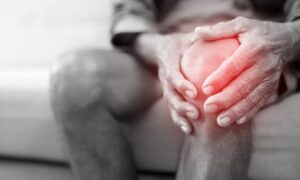 Often termed the ‘wear and tear’ arthritis, osteoarthritis is a degenerative joint condition. It arises when the protective cartilage at the ends of bones deteriorates over time. The knee, being a weight-bearing joint, is especially susceptible.
Often termed the ‘wear and tear’ arthritis, osteoarthritis is a degenerative joint condition. It arises when the protective cartilage at the ends of bones deteriorates over time. The knee, being a weight-bearing joint, is especially susceptible.
- Symptoms:
- Gradual increase in pain which might worsen after activity
- Swelling and tenderness
- Decreased flexibility and range of motion
- A grating sensation during movement
Injuries
From ligament tears to fractures, acute injuries can lead to immediate knee stiffness. Even post-recovery, chronic stiffness can persist due to scar tissue or altered joint mechanics.
- Symptoms:
- Sharp, sudden pain at the time of injury
- Swelling and inflammation
- Instability or the feeling of the knee giving way
- Visible deformity in severe cases
Bursitis
The knee contains small fluid-filled sacs, or bursae, that cushion and reduce friction. Inflammation of these sacs can lead to pain and restricted movement.
- Symptoms:
- Localized swelling and warmth
- Tenderness when pressing on the knee
- Pain that worsens with movement or prolonged sitting
Rheumatoid Arthritis (RA)
 A systemic autoimmune condition, RA makes the body mistakenly attack its joints, leading to inflammation.
A systemic autoimmune condition, RA makes the body mistakenly attack its joints, leading to inflammation.
- Symptoms:
- Morning stiffness lasting longer than 30 minutes
- Symmetrical joint pain (both knees affected)
- Warmth and redness around the joint
- Fatigue and weight loss
Tendinitis
Tendinitis arises when the tendons, which connect muscles to bones, become inflamed, often due to overuse or strain.
- Symptoms:
- A dull, aching pain especially with movement
- Swelling at the tendon site
- Tightness and restricted mobility
Gout
Caused by uric acid crystal buildup, gout results in episodes of severe pain in the affected joint.
- Symptoms:
- Intense joint pain, often occurring at night
- Persistent discomfort even after the pain subsides
- Redness, warmth, and swelling in the knee
Infection or Septic Arthritis
Rarely, bacteria can invade the knee joint, leading to infection.
- Symptoms:
- Intense pain, even at rest
- Joint swelling and redness
- Fever and chills
Prolonged Immobilization
 Being in one position for an extended period, as with a cast or long bed rest, can lead to stiffness once movement resumes.
Being in one position for an extended period, as with a cast or long bed rest, can lead to stiffness once movement resumes.
- Symptoms:
- Difficulty moving the knee after a period of inactivity
- Mild swelling or puffiness around the joint
- A feeling of tightness or constriction in the knee
These are just a few primary causes, and it’s essential to note that multiple factors might coalesce, leading to stiffness. Recognizing and understanding the root cause is pivotal, as treatment strategies often vary depending on the underlying condition.
Home Remedies for Instant Relief
 Transitioning from understanding the causes and symptoms, let’s navigate toward solutions that are within arm’s reach. While professional medical advice is paramount, there are several home remedies to provide a quick reprieve from stiff knee pain.
Transitioning from understanding the causes and symptoms, let’s navigate toward solutions that are within arm’s reach. While professional medical advice is paramount, there are several home remedies to provide a quick reprieve from stiff knee pain.
- RICE Method:
- Rest: Give your knee a break from regular activities, especially if they exacerbate the pain.
- Ice: Apply cold packs for 15-20 minutes several times a day. This helps reduce swelling and numbs the area, temporarily relieving pain.
- Compression: Use a compression bandage or knee brace to support the affected area. This can help reduce swelling and provide stability.
- Elevation: Lift your knee above the level of your heart, ideally when lying down. This can help reduce swelling by allowing fluids to drain away from the knee.
- Herbal Applications:
- Ginger: Due to its anti-inflammatory properties, ginger can be applied topically or consumed as a tea.
- Turmeric: Curcumin, the active ingredient in turmeric, has potent anti-inflammatory effects. Consider applying a turmeric paste to the knee or adding it to your diet.
- Eucalyptus Oil: Applying a blend of eucalyptus oil and carrier oil can produce a cooling sensation, providing temporary relief.
- Warm Bath or Heat Packs: A warm bath can relax the muscles around your knee. If a bath isn’t feasible, consider applying heat packs to relax the joint and surrounding muscles.
- Over-the-Counter Pain Relievers: Non-prescription medications like ibuprofen or acetaminophen can provide temporary pain relief. Always follow recommended dosages and consult with a pharmacist or doctor if unsure.
These remedies can offer a quick respite. However, if the pain persists or is recurrent, it’s crucial to consult a medical professional to understand the underlying cause and get a tailored treatment plan.
Essential Exercises for Stiff Knee Pain Management
As the age-old adage goes, “Motion is lotion.” To keep your knees functioning optimally and free from stiffness, integrating specific exercises into your daily routine can be transformative. Let’s delve into some essential exercises that can be your knee’s best ally.
Quad Sets

- Description: This exercise strengthens the quadriceps, the large muscles in front of your thigh.
- How to: Sit or lie down with your leg extended. Tighten your quadriceps by pressing your knee down. Hold for a few seconds and release.
- Frequency: Repeat 10-15 times for each leg.
Straight Leg Raises
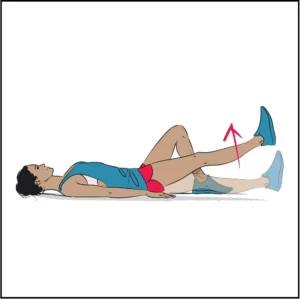
- Description: Another excellent exercise for the quadriceps without bending the knee.
- How to: Lie on your back with one knee bent and the other leg straight. Tighten your quadriceps and lift the straight leg up about a foot off the ground. Hold for a few seconds and slowly lower.
- Frequency: Repeat 10-15 times for each leg.
Hamstring Curls
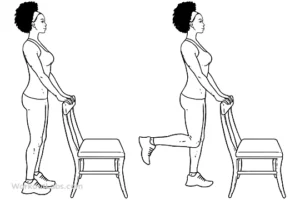
- Description: Targets the hamstrings, the muscles at the back of your thigh.
- How to: Stand holding onto a chair or wall for balance. Bend one knee, bringing your heel towards your buttock. Hold and then slowly lower.
- Frequency: Repeat 10-15 times for each leg.
Knee Extension Stretch

- Description: Helps in improving flexibility and reducing stiffness.
- How to: Sit on a chair with another chair opposite you. Place the affected leg on the opposite chair. Gently push down on the knee until you feel a stretch. Hold for a few seconds and release.
- Frequency: Repeat 5-10 times.
Calf Stretch
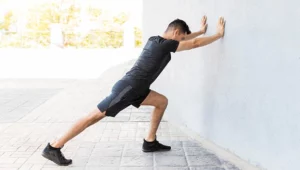
- Description: This stretch targets the calf muscles and can indirectly relieve knee stiffness.
- How to: Stand facing a wall with your hands pressed against it. Step one foot back, keeping it flat on the ground. Bend the front knee while keeping the back leg straight and press the heel down.
- Frequency: Hold for 20-30 seconds and switch sides.
Heel Slides

- Description: Increases knee flexion.
- How to: Lie on your back with legs straight. Slowly slide your heel towards your buttock, bending the knee. Slide back to the starting position.
- Frequency: Repeat 10-15 times for each leg.
Remember, while these exercises can be beneficial, it’s crucial to listen to your body. If any movement causes increased pain or discomfort, stop immediately. Additionally, consulting a physical therapist or an expert can provide personalized exercises tailored to your needs and ensure you’re doing them correctly.
When to Seek Specialist Intervention
Addressing stiff knee pain requires a combination of proactive personal care and professional insights. While exercises and home remedies play their part, there are times when it’s crucial to escalate your approach. Let’s explore when it’s apt to consult specialists and the non-surgical interventions they might recommend.
- Persistent Pain: If the stiffness and associated pain remain consistent or increase over weeks, even with at-home treatments.
- Decreased Range of Motion: If there’s a noticeable restriction in how far you can bend or straighten your knee.
- Swelling: Any unexplained or prolonged swelling, especially if accompanied by heat or redness.
- Sounds: Continuous clicking, popping, or grinding noises when moving the knee.
- Instability: A feeling of your knee giving out or being unable to support your weight.
If any of the above signs are evident, it’s time to consider specialist intervention.
Non-Surgical Treatment Options To Manage Discomfort
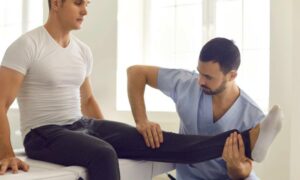
- Physical Therapy: A physical therapist can craft a tailored exercise regimen to strengthen the knee muscles, improve flexibility, and reduce stiffness.
- Joint Fluid Supplements: Injections like hyaluronic acid can act as lubricants and cushioning agents, providing temporary relief from stiffness.
- Corticosteroid Injections: Administered directly into the knee joint, these can offer relief from inflammation and pain.
- Bracing or Taping: Knee braces or tape can offer additional support, alleviate pressure from specific areas of the knee, and improve alignment.
- Acupuncture: An alternative therapy that involves inserting thin needles at specific points, which can help reduce knee pain and stiffness for some individuals.
Considering these non-surgical treatments, always discuss with a healthcare professional to determine the most suitable approach for your individual condition. They can provide insights, guide you through the process, and ensure a safer journey towards recovery.
Lifestyle Adjustments to Prevent Knee Stiffness
Incorporating small yet significant lifestyle changes can play a pivotal role in preventing stiff knee pain and ensuring prolonged joint health. From the food we consume to the daily habits we cultivate, a proactive approach can make all the difference. Here’s a comprehensive guide to lifestyle adjustments that can either ward off or mitigate the discomfort of a stiff knee.
- Maintain a Healthy Weight: Shedding those extra pounds can significantly reduce the risk of knee problems. So, opt for a balanced diet and regular exercise, emphasizing low-impact activities.
- Stay Active but Choose Wisely: While physical activity is essential, it’s vital to choose exercises that are gentle on the knees.
- Dietary Considerations: Certain foods have anti-inflammatory properties that can help alleviate joint stiffness. You can include omega-3 rich foods like fish, flaxseeds, and walnuts.
- Regular Stretching: Stretching keeps the muscles flexible, strong, and healthy, which in turn supports the knee, reducing the chances of stiffness.
- Proper Footwear: The shoes you wear can influence knee health. Poorly fitting or unsupportive shoes can exacerbate knee problems.
- Mind Your Posture: Regularly assess your posture, especially when sitting for extended periods, and make necessary adjustments.
- Avoid Prolonged Sitting: If you have a desk job, ensure you take short breaks every hour to walk or stretch.
Remember, the journey to a healthier knee is continuous. Integrating these lifestyle adjustments can help ensure that your knees remain supple and free from stiffness for years to come.
Conclusion
Our knees play a crucial role in nearly every movement we make. While lifestyle adjustments can significantly contribute to their health, there’s no replacement for expert advice and intervention, especially when pain due to a stiff knee arises. If you’re grappling with knee pain or stiffness, remember you’re not alone in this journey. Expert assistance is just a click away. If you’re experiencing Knee pain, physical therapy for knee pain at PhysioMantra can help: Book an online physical therapy session.



